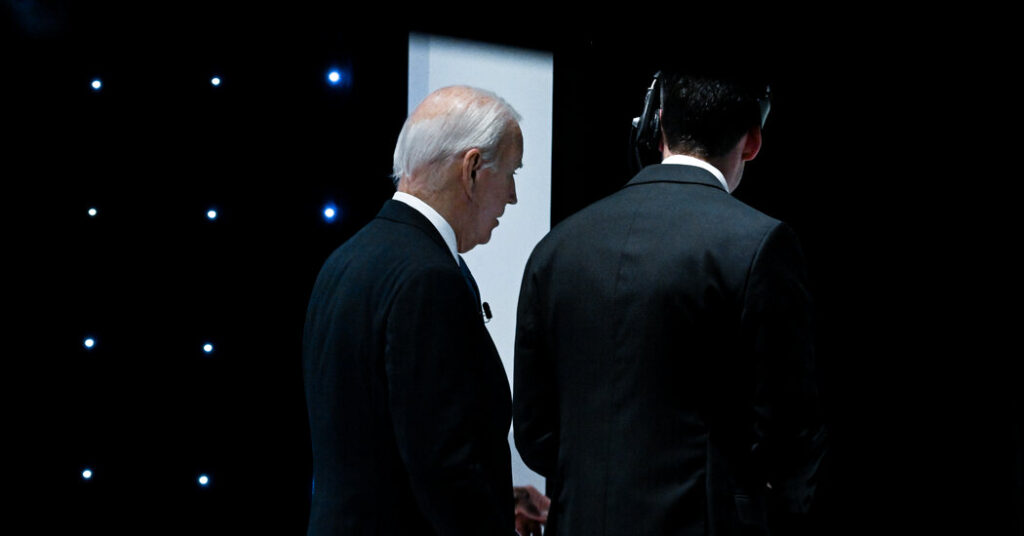A once politically far-fetched question — can President Biden be replaced at the top of the Democratic Party presidential ticket — has taken on new urgency after Mr. Biden’s halting debate performance against former President Donald J. Trump.
The short answer is yes — assuming Mr. Biden decides on his own to step aside. But if Mr. Biden decides not to step aside, the short answer is probably no.
Either way, the process would be complicated and would open the door to political upheaval between now and when Democratic delegates gather to vote for a nominee at their convention in August.
Mr. Biden has the power to leave the race and release all the pledged delegates he has accumulated — 3,894 of 3,937 committed so far, according to a tally by The Associated Press — during his march to the nomination. If he were to do so, those delegates would be free to vote for whomever they chose. That would lead to an open convention, a rarity in modern American politics.
The prospect raises many questions.
Could President Biden, should he decide to drop out of the race, compel his delegates to support a candidate of his choosing?
No. He could certainly endorse a successor, and that would count for something. But once the delegates are free, they are free. Loyalty to Mr. Biden, which runs deep, does not automatically extend beyond him. And there could be a floor fight over who would emerge as the nominee, highlighting already festering ideological divides in the party, and potentially weakening a future Democratic candidate heading into the fall campaign.
What would that mean for Vice President Kamala Harris?
Ms. Harris would most likely be one of probably a half-dozen candidates vying for the presidential nomination, but her standing in the party is questionable after what many have seen as a rocky tenure and weak poll numbers. She also would not be assured the No. 2 spot on the ticket, even if she wanted it, should Mr. Biden be replaced.
What is the timeline for a decision?
If there is one upside for Democrats about Mr. Biden’s disastrous debate performance, it is that it happened in June, rather than the weeks before the election, when debates traditionally have been held.
There is time to act, which would not have been the case had this unfolded at a debate in September.
The nominating convention in Chicago opens on Aug. 19. But the party approved rules to hold a virtual roll call before Aug. 7, to work around an Ohio law that required all presidential candidates to be legally certified by that date in order to appear on the November ballot. So we are basically talking about a five-week window.
A total of 3,934 pledged delegates will vote on the first ballot. If a candidate receives a simple majority of 1,968, that person will be the nominee.
Should Mr. Biden resist pressure to step aside, is there any way the party could move unilaterally to replace him?
Well, never say never. There would seem to be a bit of wiggle room in the party’s official rules. “All delegates to the National Convention pledged to a presidential candidate shall in all good conscience reflect the sentiments of those who elected them,” they read.
So in theory — note the words “in all good conscience” — it would appear that the Democratic convention could vote for someone else.
But this is not the Democratic Party of 1968, when the rules permitted party bosses to impose their will. In fact, the rules were rewritten after that specifically to make the party a much more free-flowing organization.
“This is not the old days,” said Elaine Kamarck, a senior fellow at the Brookings Institution, a Washington think tank, and an expert on convention rules and procedures. “There is no such thing as party leaders. There’s no people with the power to take away this nomination.”
“The only way that could happen without Biden’s consent is if a majority of about 4,000 delegates decided that he shouldn’t be the nominee, that they had somebody better,” she said.
Who might be considered to replace him?
In addition to Ms. Harris, there is Gov. Gretchen Whitmer of Michigan; Gov. Josh Shapiro of Pennsylvania; Gov. Gavin Newsom of California; Gov. J.B. Pritzker of Illinois; and Gov. Andy Beshear of Kentucky. Also worth mentioning are Pete Buttigieg, the secretary of transportation; Senator Amy Klobuchar of Minnesota; and Senator Cory Booker of New Jersey.
What happens if Mr. Biden were to withdraw after the convention?
The Democratic National Committee’s official procedures for the convention, adopted in 2022, give the committee the authority to choose a new candidate if either member of the ticket — the presidential or vice-presidential nominee — withdraws or dies.
The party’s national chairman, Jaime Harrison, would consult with Democratic leaders in Congress and in the Democratic Governors Association and make a report to the D.N.C., but the members themselves would have the final say.
Maggie Astor contributed reporting.
